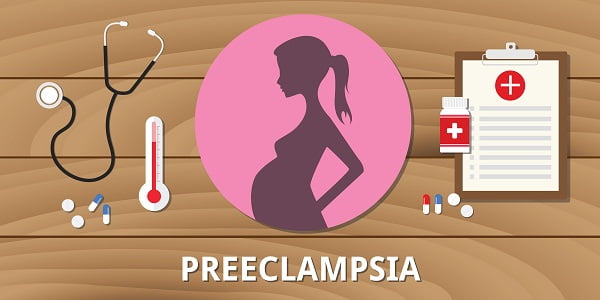What You Should Know About Preeclampsia?
- Updated on: Jul 8, 2024
- 2 min Read
- Published on Apr 19, 2021

What is Preeclampsia? What you need to know about it?
Preeclampsia is a condition associated with women that occurs only during pregnancy. Some symptoms of preeclampsia are high blood pressure and leakage of protein in the urine.
The condition typically develops after week 20 of pregnancy, although it can happen even earlier. While high blood pressure during pregnancy does not necessarily mean preeclampsia, but it may be a sign of another problem. Preeclampsia affects about 6% of women in pregnancies.
What happens if you have preeclampsia?
The condition is marked by high blood pressure (hypertension) in women who have previously not experienced high blood pressure.
Preeclamptic women have a high level of protein in their urine. Swelling appears in the feet, legs, and hands.
If it remains undiagnosed, preeclampsia can lead to eclampsia. Eclampsia is a serious condition that can put you and your baby at risk. In rare cases, it can even cause death. Women who develop preeclampsia and experience seizures are considered to have eclampsia.
Is it just a pregnancy symptom or something more?
Preeclampsia occurs only during pregnancy. If you have preeclampsia, the only cure is delivery of your baby. It automatically gets cured after the delivery of the baby.
If you’re diagnosed with preeclampsia early in your pregnancy, you and your doctor face a challenging task as your baby still needs to develop and delivery requires time.
Pregnancy is a confusing time, and your body goes through a lot of changes. It is difficult to tell what’s normal and what’s not. It is always helpful to learn about the signs and symptoms of preeclampsia, its causes, and prevention methods to help you identify a problem early and take appropriate measures accordingly.
What is the difference between preeclampsia, toxemia, PET and PIH?
There are two types of preeclampsia:
- Preeclampsia-eclampsia
- Preeclampsia superimposed on chronic hypertension
You may hear various names such as toxemia, PET (pre-eclampsia/toxemia) and PIH (pregnancy-induced hypertension), EPH gestosis (edema, proteinuria, hypertension). These terms are also used to refer the same condition. But these are outdated and no longer used by medical experts.
What causes preeclampsia?
Although the exact cause of pre-eclampsia is not known, scientists believe it occurs when there is a problem with the placenta (the organ that links the baby’s blood supply to mother’s supply). Read more about causes of preeclampsia.
Treating preeclampsia
Preeclampsia cannot be cured until the baby is delivered. When the mother’s blood pressure comes down after delivery, the condition becomes normal.
In some cases, if the preeclampsia starts early, delivery may not be the best option for the fetus.
Doctors prescribe medicines to maintain blood pressure and control other conditions.
Preeclampsia Facts
- Preeclampsia affects roughly 5-9 percent of pregnancies
- If it is not treated on time, it can develop into eclampsia, which is a potentially life-threatening condition causing seizures to develop
- The exact cause of preeclampsia is not known but it is likely to be linked with blood vessels in the placenta
- Some studies suggest that there is a genetic link also with the development of this condition
- According to a research, traffic pollution may be a possible cause or that contributes to its causes
- It is characterized by hypertension and proteinuria
- If it converts to eclampsia, there is a risk of serious complications and even the death of baby and/or mother












